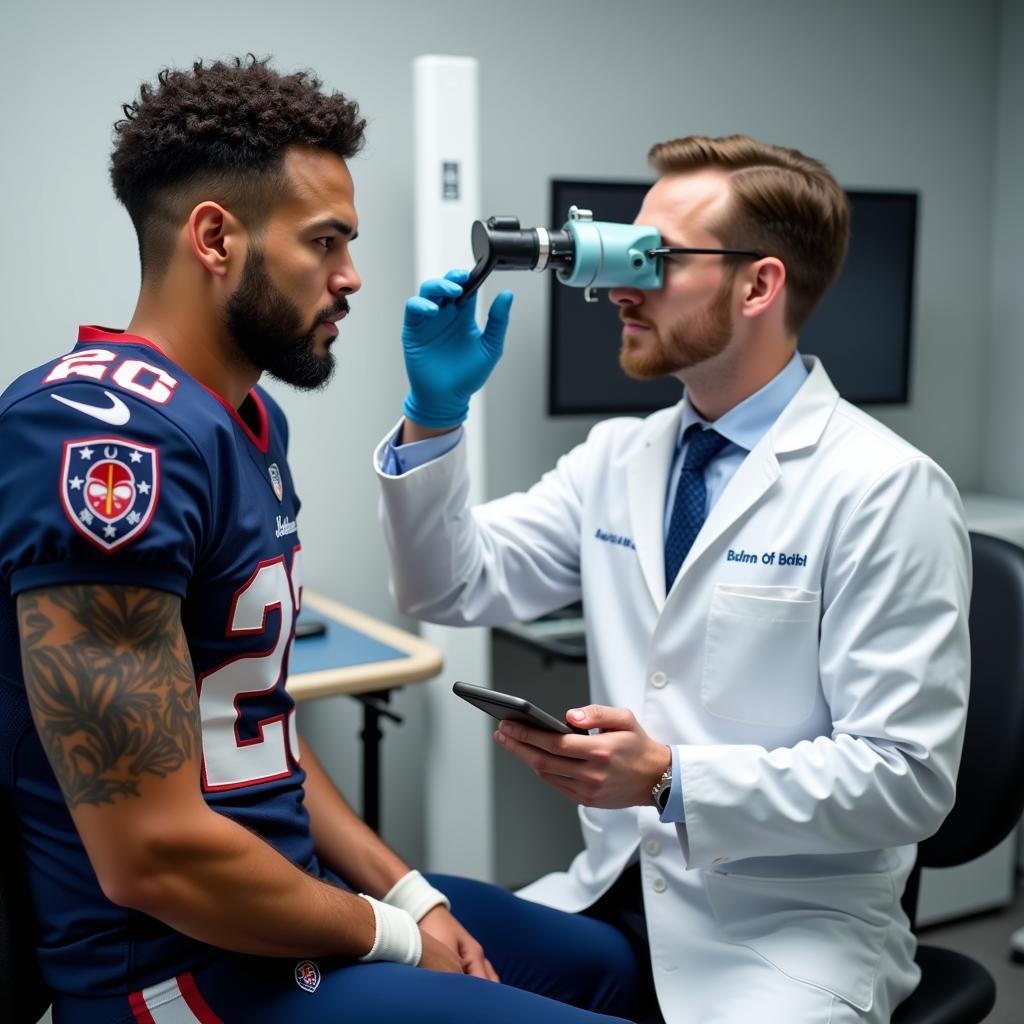Liver disease can significantly impact anyone, including athletes at the peak of their physical prowess. For a Football Player With Liver Disease, the challenges can be immense, impacting not only their career but their overall health and well-being. This article explores the complexities of liver disease in football players, examining the causes, symptoms, diagnosis, and management of this often-debilitating condition.
football player liver disease poses a significant threat to a player’s career and long-term health.
Understanding Liver Disease in Football
Liver disease encompasses a range of conditions affecting the liver, a vital organ responsible for numerous bodily functions. These conditions can range from mild inflammation to severe scarring (cirrhosis) and liver failure. For football players, the physical demands of the sport can exacerbate existing liver conditions or even contribute to their development.
Common Types of Liver Disease in Athletes
Several types of liver disease can affect football players, including:
- Alcoholic Liver Disease: Excessive alcohol consumption can damage the liver, leading to inflammation and scarring.
- Non-alcoholic Fatty Liver Disease (NAFLD): This condition is characterized by the buildup of fat in the liver, often linked to obesity, diabetes, and high cholesterol.
- Viral Hepatitis: Infections like hepatitis B and C can cause liver inflammation and damage.
- Autoimmune Hepatitis: The body’s immune system mistakenly attacks the liver cells, leading to inflammation and damage.
- Hemochromatosis: A genetic disorder causing excessive iron absorption and storage, potentially damaging the liver.
 Football Player Experiencing Liver Disease Symptoms
Football Player Experiencing Liver Disease Symptoms
Recognizing the Symptoms
The symptoms of liver disease can be subtle, especially in the early stages. Some common signs to watch out for include:
- Fatigue and weakness
- Loss of appetite
- Nausea and vomiting
- Abdominal pain and swelling
- Jaundice (yellowing of the skin and eyes)
- Dark urine and pale stools
- Itching
Diagnosis and Management of Liver Disease
Early diagnosis is crucial for effectively managing liver disease. If a football player experiences any of the mentioned symptoms, it’s essential to seek medical attention. A physician will conduct a thorough evaluation, including a physical exam, blood tests, and imaging studies to determine the cause and severity of the liver condition.
Treatment Options and Lifestyle Changes
Treatment for liver disease varies depending on the underlying cause. Medications may be prescribed to manage symptoms, control inflammation, or combat viral infections. Lifestyle modifications are often essential, including:
- Maintaining a healthy weight
- Adopting a balanced diet
- Limiting alcohol consumption
- Avoiding unnecessary medications
- Engaging in regular exercise (as advised by the physician)
football player dies liver disease serves as a stark reminder of the seriousness of this condition.
Impact on a Football Career
Liver disease can significantly impact a football player’s career. The fatigue, weakness, and other symptoms can hinder performance, making it difficult to train and compete at a high level. In severe cases, liver disease can force players to retire prematurely.
 Football Player Receiving Treatment for Liver Disease
Football Player Receiving Treatment for Liver Disease
“Early detection and proper management are crucial for mitigating the long-term impact of liver disease on a player’s career,” says Dr. James Carter, a leading sports medicine specialist. “A multidisciplinary approach involving physicians, nutritionists, and physical therapists is often necessary to ensure the best possible outcome.”
Living with Liver Disease: Support and Resources
Living with liver disease can be challenging, both physically and emotionally. Support groups and online communities can provide valuable resources, connecting individuals with others facing similar challenges. It’s important for football players with liver disease to have a strong support system to help them navigate the difficulties of their condition.
“Maintaining a positive outlook and adhering to the recommended treatment plan can significantly improve a player’s quality of life,” says Dr. Sarah Miller, a renowned hepatologist. “Open communication with coaches, teammates, and medical staff is also essential for fostering a supportive environment.”
Conclusion
Liver disease presents a formidable challenge for football players. Early diagnosis, appropriate treatment, and lifestyle modifications are critical for managing the condition and minimizing its impact on a player’s career and overall health. With the right support and resources, football players with liver disease can continue to lead fulfilling lives, both on and off the field.
FAQ
- What are the most common causes of liver disease in football players?
- How can football players prevent liver disease?
- What are the long-term effects of liver disease?
- Can a football player with liver disease continue playing professionally?
- Where can football players find support and resources for liver disease?
- What are the latest advancements in liver disease treatment?
- How can family and friends support a football player with liver disease?
Need assistance? Contact us 24/7: Phone: 0869066600, Email: [email protected] or visit our office at 491 An Duong Vuong St., Binh Tan Dist., Ho Chi Minh City 71907, Vietnam.